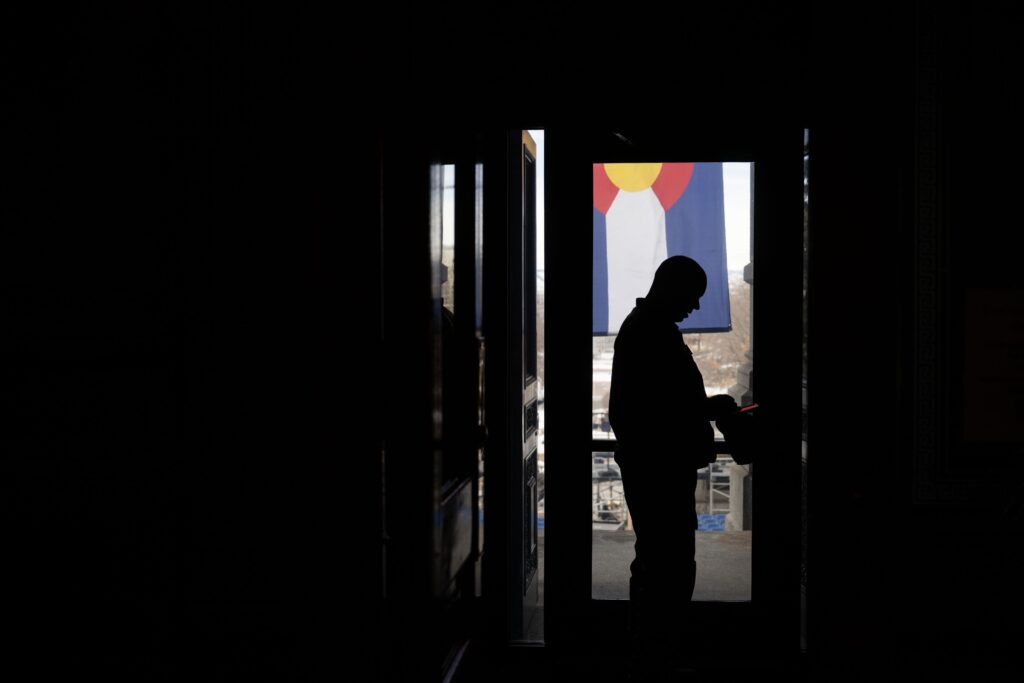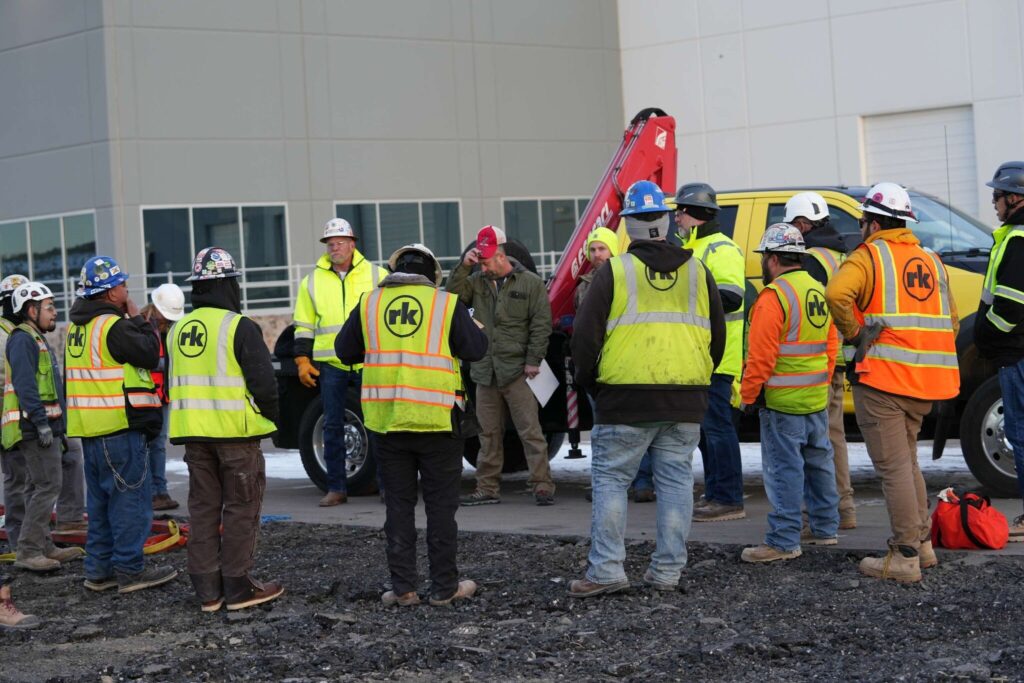Colorado bill requiring ‘tip offset’ in restaurant workers’ wages advances
After more than five hours of testimony, a panel of Colorado lawmakers advanced a bill that would lower the pay for tipped workers in places where a local government’s minimum wage sits higher than what the state imposes.
The proposal has set up a major battle between unions and their allies, who argue that the bill is a wage cut, and restaurant owners, who said the current wage situation in places like Denver is untenable.
House Bill 1208, sponsored by Denver Democratic Reps. Steven Woodrow and Alex Valdez would amend Colorado’s tipping statute to allow local governments to set minimum wages above the state threshold — but they must provide a tip offset of at least $3.02.
Under the bill, local governments with minimum wages above the state’s $11.79 per hour for tipped employees — currently Denver, Boulder, and Edgewater — would be required to impose tip offsets equal to $3.02, plus the difference between the local and the state’s minimum wage amounts.
#dsk-box-ad-e.new-ad-loading [id*=”-outstream-icon”] {display: none !important;}[id*=”-outstream-icon”],[id*=”-outstream-icon”] > img {width: 24px;height: 24px;display: block;cursor: pointer !important;font-size: 24px !important;line-height: 1 !important;max-width: unset !important;vertical-align: unset !important;box-shadow: unset !important;}[id*=”-outstream-icon”]:hover {filter: drop-shadow(black 0px 0px 6px);}#bottom-controls_videoPlayer_6264 {position: absolute;bottom: 5px;left: 5px;display: grid;grid-template-columns: 24px 24px;}#tpd-volume-control_videoPlayer_6264.muted > #volume-on-outstream-icon_videoPlayer_6264,#tpd-volume-control_videoPlayer_6264:not(.muted) > #volume-muted-outstream-icon_videoPlayer_6264 {display: none;}#tpd-play-pause-control_videoPlayer_6264[playing=”true”] > #click-to-play-outstream-icon,#tpd-play-pause-control_videoPlayer_6264[playing=”false”] > #click-to-pause-outstream-icon {display: none;}@media (max-width: 770px) { #dsk-box-ad-e.new-ad-loading iframe[src],#dsk-box-ad-e.new-ad-loading video {display: none !important;} } #dsk-box-ad-e.new-ad-loading #ad-container_videoPlayer_6264 {background: #5a585830 !important;mask: linear-gradient(315deg, #000 30%, #88888855, #000 70%) right / 350% 100%;animation: tpd-shimmer 1.15s infinite;}@keyframes tpd-shimmer {100% {mask-position: left}}#dsk-box-ad-e:not(.new-ad-loading) {background: black;}#dsk-box-ad-e {opacity: 1;animation-name: fadeInOpacity;animation-iteration-count: 1;animation-timing-function: ease-in;animation-duration: 0.75s;}@keyframes fadeInOpacity {0% {opacity: 0;}100% {opacity: 1;}}#dsk-box-ad-e.new-ad-loading #progress-row_videoPlayer_6264,#dsk-box-ad-e.has-countdown #progress-row_videoPlayer_6264 {display: none;}#progress-row_videoPlayer_6264 {width: 100%;display: block;bottom: 0px;position: absolute;}#dsk-box-ad-e.new-ad-loading #progressLabel-container_videoPlayer_6264 {display: none;}@media (max-width: 770px) { #progressLabel-container_videoPlayer_6264 {display: none;} } #dsk-box-ad-e.has-countdown #progressLabel-container_videoPlayer_6264 {display: none;}#progressLabel-container_videoPlayer_6264 {width: 640px;position: absolute;bottom: 15px;height: 0px;}#progressLabel_videoPlayer_6264 {color: white;font-size: 7pt;font-family: Arial, Sans-Serif;text-align: center;width: fit-content;height: 5px;margin: auto;}#progressBar_videoPlayer_6264 {width: 640px;height: 3px;background-color: lightgray;}#progress_videoPlayer_6264 {height: 100%;background-color: cornflowerblue;width: 0;}#dsk-box-ad-e:not(.replay) #replay-outstream-container_videoPlayer_6264 {display: none !important;}#dsk-box-ad-e.replay #replay-outstream-container_videoPlayer_6264 {display: flex;height: 100%;width: 100%;z-index: 99;position: relative;background: black;}#dsk-box-ad-e.replay #replay-outstream-icon_videoPlayer_6264 {width: 30px;height: 30px;margin: auto;position: relative;background-image: url(‘data:image/svg+xml,%3Csvg fill=”white” height=”30px” width=”30px” xmlns=”https://www.w3.org/2000/svg” viewBox=”0 0 74.999 74.999″ xml:space=”preserve” stroke=”black”%3E%3Cpath d=”M33.511 71.013c15.487 0 28.551-10.563 32.375-24.859h9.113L61.055 22 47.111 46.151h8.006c-3.44 8.563-11.826 14.628-21.605 14.628-12.837 0-23.28-10.443-23.28-23.28 0-12.836 10.443-23.28 23.28-23.28 6.604 0 12.566 2.768 16.809 7.196l5.258-9.108c-5.898-5.176-13.619-8.32-22.065-8.32C15.034 3.987 0 19.019 0 37.5c-.002 18.481 15.03 33.513 33.511 33.513z”/%3E%3C/svg%3E’);}#dsk-box-ad-e.replay #bottom-controls_videoPlayer_6264_videoPlayer_6264,#dsk-box-ad-e.replay [id*=”-outstream-icon”]:not([id^=”replay-outstream-icon”]) {display: none !important;}#dsk-box-ad-e.replay #video-container_videoPlayer_6264 {display: none !important;}#dsk-box-ad-e {margin-left: auto;margin-right: auto;}/* Main Styling */#dsk-box-ad-e.first-render {display: none !important;}#page-content_videoPlayer_6264 {display: inline-block;}#video-container_videoPlayer_6264 {position: relative;}#video-element_videoPlayer_6264 {position: absolute;top: 0;left: 0;}/* Some providers inject their ad content into the video element *//* but if not we hide it. */#video-element_videoPlayer_6264:not([src]) {display: none;}#ad-container_videoPlayer_6264 {position: absolute;top: 0;left: 0;cursor: pointer;}#dsk-box-ad-e,#page-content_videoPlayer_6264,#video-container_videoPlayer_6264,#video-element_videoPlayer_6264,#ad-container_videoPlayer_6264 {width: 640px;height: 360px;}#dsk-box-ad-e div[id*=”google_ads_iframe_”] {width: 640px !important;height: 360px !important;z-index: -1;position: absolute;}
In Denver, the bill would lower restaurant workers’ minimum wage by $4 an hour, according to a fiscal analysis.
While the bill allows local governments to adjust their tip offsets, they cannot reduce them by less than $3.02 or more than 50 cents per year or increase them by an amount that would result in an employee earning less than minimum wage, minus $3.02.
Sponsors said the bill aims to address the unintended consequences of a 2019 law that allowed local governments to establish minimum wages above the state threshold. Critics said it cuts wages at a time of soaring expenses for workers.
While the law was well-intentioned, Woodrow said it has seriously strained the restaurant industry.
More than 200 restaurants closed across Colorado last year. Some 20,000 restaurant workers in Denver lost their jobs in the previous three years, as 22% of the city’s restaurants had shut down.
As a former restaurant worker, Woodrow said he understands how difficult service work is and believes all tipped employees deserve to make a livable wage. However, he said, the Colorado General Assembly’s actions six years ago have disproportionately harmed restaurant owners.
“I understand that there are concerns and anxiety around this bill,” he said. “No one wants our workers to be paid any less. I’ve dedicated my time in this building to fighting for workers and consumers, and I assure you, that minus the obviously real concerns with wage theft, no one under this bill is to make below minimum wage. It is about how much is to be borne out by the employer.”
Valdez said most restaurants forced to close in Colorado have been small businesses. To cut costs, many have eliminated once-common positions, such as bussers and bar backs, to cut costs. Valdez said he believes the bill will help restore balance between tipped workers and their employers.
“What I’m really afraid of is that we’re entering a cycle, and that we’re gonna see restaurants continue to choose to leave the Denver city limits for other cities, or worse yet, just pull up stakes and call it quits,” he said. “We don’t want that. We want to have a thriving restaurant scene because that is how we have a thriving workforce.”
Restaurant owners say they need to stay afloat, too
Cody Higginbottom opened Public Offering Brewing in 2022.
The Denver brewery employs six tipped workers, half working less than 30 hours weekly. Higginbottom said he has prioritized ensuring that his employees make enough to live in a city with a high cost of living.
Still, wages and payroll-related expenses consume about a quarter of his gross revenue. To manage costs, Higginbottom said he’s had to cut shifts, and because he can’t afford to hire a brewer, he works as both the owner and brewer, leaving him with less time to focus on growing his business.
According to Higginbottom, his tipped employees make an average of $47 an hour — 70% more than he and his taproom manager make.
“I want to pay our employees as much as possible and provide a livable income, but I also think there should be a fair and equitable pay structure,” he said.
Delores Tronco, who owns Greenwich on Larimer Street, a restaurant that employs 24 people with an annual payroll of nearly $900,000, offered a similar story.
She said she would not renew her lease if she is forced to keep up with Denver’s ever-increasing minimum wage hikes.
“Costs are simply too high, and that is for every single thing I need to run my business, from food to labor to insurance.”
Tronco said Denver’s minimum wage has increased 95% since 2019.
“I care deeply about my employees and want to see all of them earn a living wage, but under current policy, we’re championing the well-being of one group, tipped employees, over all others,” said Tronco, adding that the back of house staffers — dishwashers, bussers, fry cooks and others, who do not earn tips — earn an average of 40 to 50% less than their tipped colleagues.
Jeff Foster, the owner of Little Piggy Hospitality in Boulder who has worked in the restaurant industry for 30 years across six states, said that his company, which operates three restaurants and a catering business, pays 200 employees well above the state minimum wage.
While the restaurant industry has faced many challenges in recent years, Foster said his top priority is ensuring fair and equitable pay for his staff.
“I want my employees to make money,” he said. “I want them to feel as if their time and work is valued. I want them to be rewarded for the hard work that they put in every day. But in the absence of thoughtful change to our current wage structure, I feel that fewer and fewer restaurants will remain open or choose to open to serve the public and employ the hardworking professionals that are the backbone of our industry.”
Union says workers cannot afford a wage cut
True Apodaca of SEIU Local 105 called the bill “a wage cut, plain and simple.”
“Supporters of this bill will try to tell you that it’s not a pay cut. They’ll try to distract you with a misleading numbers and cherry-picked restaurant closures, but the facts are undeniable. This bill slashes wages for tipped workers in Denver, Boulder, and Edgewater by as much as $8,000 a year,” he said.
The bill contradicts the Colorado General Assembly’s efforts to make Colorado more affordable, as tipped employees would lose out on pay, while the state’s cost of living continues to increase, Apodaca said.
Before cutting employees’ wages, the restaurant industry should look into reforming to its deeply flawed business model, Apodaca argued.
“This bill perpetuates a system that has exploited workers for over a century,” he said. “House Bill 1208 will worsen the financial security of tens of thousands of Coloradans who work for tips by reducing their base pay and forcing them to rely even more on unpredictable tips.”
Charles Brennan of the Colorado Center on Law and Policy said the organization’s analysis found that if the bill passes, the average server in Denver could lose more than $3,000 a year in pay. Statewide, Colorado workers could lose up to $155 million in wages yearly, Brennan said.
“Proponents claim restaurants are closing due to these minimum wage increases, but the data tells a different story,” said Brennan, pointing to information from the Bureau of Labor Statistics that found that the number of restaurants in Colorado grew by 3.5% from 2020 to 2024, with Denver gaining 27 restaurants in that period.
Assertions that tipped workers make in excess of $40 an hour is also largely untrue, argued Brennan, pointing to the statistics bureau‘s figures saying the average Colorado server makes about $16 an hour, with tips.
“Tips are meant to reward workers for good service, not subsidize employer payroll costs,” he said. “This bill ignores that by asking workers to finance their own pay cuts at a time that cost of living is rising.”
The bill passed by an 11-2 vote, with Democratic Reps. Bob Marshall of Highlands Ranch and Sheila Lieder of Littleton, voting in opposition.
Marshall called the bill the most difficult he’s encountered so far this legislative session. He said he worries about the bill’s abrupt “wage cuts,” arguing that a gradual approach would be more fair.
Lieder said action is necessary to address the affordability crisis in the restaurant industry, but cutting wages isn’t that answer.
“I just can’t support cutting wages from workers when they’re already hurting when there’s other options that need to be looked at,” she said.
The Colorado Restaurant Association, a strong supporter of the bill, lauded the bill’s passage out of House Business Affairs and Labor Committee.
“Restaurants spoke from the heart during the hearing, explaining how their kitchen crews are being left behind when it comes to wages and how their businesses are in peril,” said Sonia Riggs, the association’s president and CEO. “If the tip credit isn’t fixed, we’re going to lose the hearts and souls of our communities, and thousands of workers will be out of work.”
The bill will now go before the House Finance Committee, as it carries a fiscal note of more than $92,000 for fiscal year 2025-2026 and more than $45,000 for fiscal year 2026-2027.











